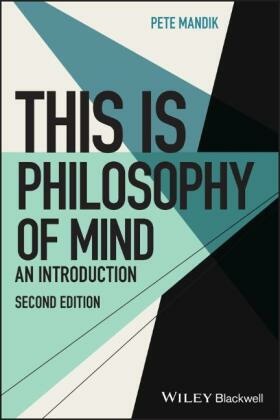
This Is Philosophy of Mind - An Introduction
| Verlag | Wiley & Sons |
| Auflage | 2022 |
| Seiten | 288 |
| Format | 15,7 x 23,3 x 1,6 cm |
| Gewicht | 214 g |
| Artikeltyp | Englisches Buch |
| Reihe | This is Philosophy |
| EAN | 9781119718888 |
| Bestell-Nr | 11971888UA |
Discover fascinating and illuminating contributions to historical and contemporary issues in the philosophy of mind In the newly revised second edition of This Is Philosophy of Mind: An Introduction, accomplished philosopher Pete Mandik delivers an accessible primer on the core issues animating contemporary and historical discussions in the philosophy of mind. The book is part of the This is Philosophy series that introduces undergraduate students to key concepts and methods in the study of philosophy. This particular edition walks readers through perennial issues like the mind-body problem, artificial intelligence, free will, and the nature of consciousness. This is Philosophy of Mind: An Introduction also provides complimentary access to valuable supplemental online resources.
Inhaltsverzeichnis:
How to Use This Book xv
Acknowledgments xvii
About the Companion Website xix
1 Meet Your Mind 1
Aspects of Mind 1
Thought and experience 1
Conscious and unconscious 2
Qualia 3
Sensory perception 3
Emotion 4
Imagery 4
Will and action 5
Self 5
Propositional attitudes 5
Philosophical Problems 6
Mind-body problem 6
Other problems 9
Conclusion 14
Annotated Bibliography 14
2 Substance Dualism 15
Arguments for Substance Dualism 15
Leibniz's law arguments 16
Criticism of Leibniz's law arguments: Intensional fallacy 19
Explanatory gap arguments 20
Criticisms of explanatory gap arguments 21
Modal arguments 22
Mind-Body Interaction as a Problem for Substance Dualism 24
Princess Elisabeth's objection 25
The dualistic alternatives to Cartesian interactionism 26
Conclusion 27
Annotated Bibliography 28
3 Property Dualism 29
Introduc ing Property Dualism: Qualia and the Brain 29
The Inverted Spectrum 30
Attack of the Zombies 32
The Knowledge Argument 34
The Explanatory Gap Argument 37
Does Property Dualism Lead to Epiphenomenalism? 39
How Do You Know You're Not a Zombie? 40
Conclusion 42
Annotated Bibliography 42
4 Idealism, Solipsism, and Panpsychism 44
Solipsism: Is It Just Me? 45
Idealism: It's All in the Mind 49
Berkeley's argument from pain 50
Berkeley's argument from perceptual relativity: Berkeley's bucket 51
Berkeley's "Nothing but an idea can resemble an idea" 51
Berkeley's master argument 52
Why Berkeley is not a solipsist 52
Arguing against idealism 53
Panpsychism: Mind Is Everywhere 53
The analogy argument 54
The nothing from nothing argument 55
The evolutionary argument 56
Arguing against panpsychism: The combination problem 57
Conclusion 58
Annotated Biblio graphy 58
5 Behaviorism and Other Minds 59
Behaviorism: Introduction and Overview 59
The History of Behaviorism 61
Ludwig Wittgenstein and the private language argument 62
Gilbert Ryle versus the ghost in the machine 64
Objections to Behaviorism 65
The qualia objection 65
Sellars's objection 66
The Geach-Chisholm objection 67
The Philosophical Problem of Other Minds 68
The rise and fall of the argument from analogy 69
Denying the asymmetry between self- knowledge and knowledge of other minds 70
Conclusion 71
Annotated Bibliography 72
6 Mind as Brain 74
Introducing Mind-Brain Identity Theory 74
Advantages of Mind-Brain Identity Theory 75
A Very Brief Overview of Neuroscience 76
Major parts and functions of the nervous system 77
Major parts and functions of the brain 77
Neurons, neural activations, and brain states 78
Lesions, imaging, and electrophysiology 78 Localism and holism 78
Learning and synaptic plasticity 79
Computational neuroscience and connectionism 79
Neural correlates of consciousness 80
On pain and c- fibers 80
Some General Remarks about Identity 81
Arguments against Mind-Brain Identity Theory 83
The zombie argument 83
The multiple realizability argument 84
Max Black's "distinct property" argument 86
Conclusion 87
Annotated Bibliography 88
7 Thinking Machines 89
Can a Machine Think? 89
Alan Turing, Turing Machines, and the Turing Test 90
Alan Turing 91
Turing machines 91
The Turing test 92
Searle's Chinese Room Argument 93
Responses to the Chinese Room Argument 94
The Silicon Chip Replacement Thought E
